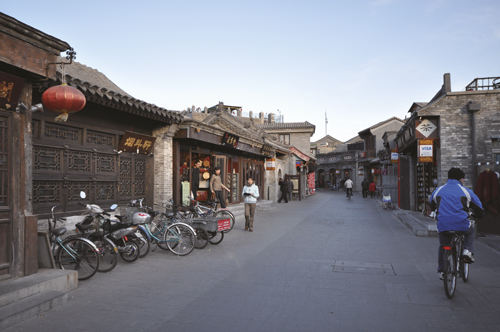Whether this is your first or tenth overseas posting, it’s only natural that you and your family will experience some culture shock when you arrive in Beijing. Even if you’ve already experienced expat life in other parts of China, Beijing has some rather unique traits. As soon as you stop expecting things to be “like home,” you can embrace the adventure.
1. The Toilet Situation
There’s good news and bad news about public toilets in Beijing. The good news is that Beijing has more public toilets than any city in the world; the bad news is that few of them meet international standards. In older hutong areas, the city’s public bathrooms serve as communal facilities. The squat toilet is still prevalent thanks to its enduring popularity with the locals and the general perception that it’s more hygienic. Increasingly, public facilities include at least one western-style toilet, usually in the disabled stall. Toilet paper, soap, hand towels, and working dryers are rarely provided, so get used to carrying tissues and hand sanitizer. Public toilets in Beijing are also infamous for their rather pungent aroma. Modern shopping malls tend to have good, clean facilities, but restaurants, bars, and cafes aren’t required to provide restrooms for their customers. Even in higher-end dining establishments, you’ll sometimes need to put on your coat halfway through the meal and stroll to the nearest restroom in the mall or building.
2. Got a Baby? Good Luck
One of the frustrating things is the lack of baby changing tables, even in the newest shopping malls and family restaurants. The cleanliness of the floors is such that you wouldn’t want to lay down a changing mat, so be prepared to change baby in their stroller, on a plot of grass, or on your lap. The locals won’t be offended by you changing baby in public, but they may stop and have a good look. Similarly, breastfeeding rights have a long way to go here and few malls have dedicated nursing rooms; pack a cloth cover when you’re planning to be out and about.
3. Your Children Will Get Photographed (A Lot)
Your children will attract a lot of attention from locals, especially in touristy areas. Like paparazzi, a few will start taking photos and you’ll be surrounded before you know it. Some will ask permission; others will hoist your child into their arms before you can protest. It’s important to understand why you’re attracting this attention. Some locals have never seen a blond-haired, African-American, or mixed-race child before. To them, you’re just as foreign as the Surma people of Ethiopia are to you. If you or your children feel genuinely uncomfortable, quickly learn the Mandarin for “Please do not take photos of my children” (qing bu yao pai wo de haizi). Otherwise, while this can be annoying at times, remember that they have good intentions and there’s no real harm done.
4. Ayi Coddling
Your transition will be made easier with the help of an ayi (Chinese term for a domestic helper or nanny). Perhaps you’ll be experiencing affordable help for the first time – a blessing that will give you some much-needed free time. Your ayi will want to make your children happy; she may buy them gifts, let them eat sweets, insist on putting on coats and shoes (even if they’re capable of doing it themselves), and hover nearby as they play, terrified that they may scrape a knee. Young Chinese kids are used to being carried everywhere; before you know it, your 3-year-old will expect you to carry them too. Explain your expectations to your ayi and demonstrate how you want her to care for your kids; be patient, as this relationship will take time to develop.
5. No Such Thing as “Right-of-Way”
One interpretation of right-of-way in Chinese is 先行权 (xian xing quan), which translates literally to “first go rights.” This pretty much sums up how road etiquette is understood and applied on the streets of Beijing. Drivers tend to adopt a “winner-takes-all” attitude. If you get your Chinese driver’s license, it won’t be long before you find yourself doing the same; it’s the only way you’ll ever get from point A to B. Teach your kids that a green pedestrian light does not mean it’s safe to cross. You’ll often find yourself dashing across eight-lane roads, weaving through the onslaught of rickshaws, taxis, bicycles, and scooters. Some locals have their own unique strategy for crossing the road: they look at their phones, stride confidently to the other side, and 90 percent of the time cars will stop for them. Drivers will opt to swerve around you and honk their horns rather than use their brakes. That being said, it’s rare that they will go so far as to yell insults at you.
6. Taxi Woes
If you have a stroller and are trying to hail a cab, be prepared for most taxis to just drive right on by. Taxi drivers don’t like picking up foreign families – especially those with young kids – because they’re worried they might dirty the car. If they do pick you up, you’ll find most cabs have removed the rear seat belts or the latter simply don’t work. If you don’t have a personal driver, it’s worth looking into car-sharing services like Uber (see p62 for more information).
7. Yes Means No (Sometimes)
The Chinese are generally much more indirect than Westerners. To start with, there are no words for “yes” or “no” in Mandarin. Locals rarely refuse a request outright or admit that they don’t know how to do something. This can be frustrating if you’re lost and in need of directions. Fear of “losing face” means a tendency to rush into saying “OK.” It’s up to you to read between the lines and decide whether that actually means “no.” It’s the same with food; Chinese often refuse food or drinks several times in a row even if they are hungry or thirsty. Never take the first “No, thank you” literally. Even if they say it once or twice, offer it again. A good guest is supposed to refuse at least once, but a good host is also supposed to offer at least twice.
8. Shopping Ain’t Easy
Beijing has a range of supermarkets, including local chains, Carrefour hypermarkets, and international grocery stores stocking imported goods. What they don’t do is provide everything you need for the weekly shop. Some won’t have a meat counter, others limited dairy, and others still only a tiny selection of baby items. Expect to spend a lot of time getting everything you need from half a dozen different stores. Pricing can vary widely; expect to see one price for locals and sometimes double for foreigners. Meat cuts are different and the Chinese like to use every part of the animal. Local supermarkets will also sell more unusual foods, like live bullfrogs and turtles.
9. Old Habits Die Hard
Young, old, male, or female – one of the first things you’ll notice is how many locals spit. Though you may find it repulsive, remember that it’s not a universally rude gesture. Once you stop seeing spitting as a personal offence, it largely fades into the background. You may or may not eventually feel the same about the clearing of nasal passages or public nose picking. Blowing your nose in a handkerchief and putting it into your pocket is considered to be disgusting by the Chinese – better to get it all out onto the street. The levels of dust and pollution here do call for the constant clearing of airways; you just have to accept that some of the locals have a very different way of dealing with theirs. Chinese babies often wear split pants, and you will see them pee and poop on the ground. To Westerners, potty training means going on a toilet; in China, it means going on command. It is not unusual for the poop to remain on the ground. If you are in the process of potty training your own child, you may need to remind them that that’s not how things are done back home.
10. Service, Please
Service standards in restaurants are slowly but steadily improving. In high-end restaurants, most of the staff will understand and speak English. Most restaurant menus will be in English or have pictures so you can point to what you’d like. Your food probably won’t be served all at once, so you’ll need to adjust your eating habits unless you want the first few dishes to be enjoyed cold. If you have young kids, most places will be pretty good about bringing out their food first.
This article originally appeared on pages 22-23 of beijingkids Home and Relocation Guide 2016/17. Click here for your free online copy. To find out how you can obtain a hard copy, contact distribution@truerun.com.
Photo: Jorge Lascar (Flickr)




